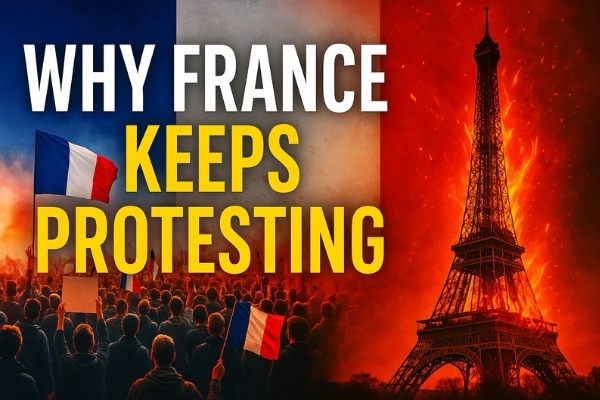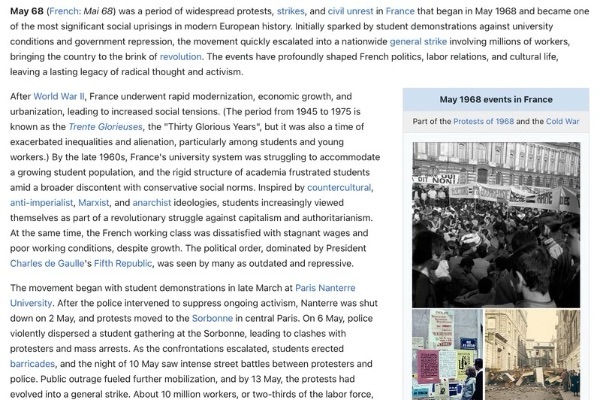France is often celebrated for its art, fashion, cuisine, and philosophy—but there’s another side to its identity that pulses just as strongly: its unrelenting spirit of protest.

From the streets of Paris in 1968 to the highways filled with Yellow Vests in recent years, and now the Block Everything demonstrations of 2025, France’s citizens have repeatedly proven that they will not remain silent when their dignity, freedoms, or futures are at stake.
For the world watching, French protest culture might look chaotic—tear gas, barricades, and streets filled with anger. But beneath the surface lies something far deeper: a national legacy of collective courage and democratic resistance. To understand today’s protests, we must trace the thread back through history, where every uprising, strike, and demonstration has left an imprint not just on France, but on the global imagination.
May 1968: The Month That Shook France
The year 1968 is etched into the DNA of modern France. What began as student-led demonstrations in Paris soon snowballed into something extraordinary: a nationwide strike of 10 million workers. Within days, France came to a grinding halt. Universities closed, factories shut down, and public life froze.
This wasn’t a protest about one single issue—it was a collective eruption against rigid authority, outdated social norms, and an economy that felt detached from the people. The protests challenged President Charles de Gaulle’s government and nearly toppled it. While political power eventually held, the effects were undeniable.
Workers gained significant labor reforms, including higher wages and better working conditions. Social hierarchies were questioned, and cultural liberation followed. Across the world, the French May ’68 spirit inspired civil rights, feminist, and anti-war movements.
The lesson? When citizens unite en masse, they can alter the trajectory of their society—even when victory doesn’t look immediate.
A Tradition of Resistance
The French spirit of rebellion, however, didn’t start in 1968. It stretches back much further.
The Revolutions of the 19th century saw repeated uprisings against monarchies and empires. Workers and peasants fought relentlessly for fair wages and rights. Each riot, each strike, each confrontation etched a powerful reminder: change rarely arrives politely; it is demanded in the streets.
Even in modern times, the world witnessed the eruption of the Yellow Vest Movement (2018–2019). Sparked by rising fuel taxes, it quickly expanded into a battle against inequality, the high cost of living, and discontent with political elites. What seemed like scattered demonstrations evolved into a national reckoning with economic justice.
Through all these moments, a pattern emerges: French protests are not mindless chaos—they are mirrors reflecting societal fractures.
Why the Streets Still Matter
In many countries, elections, courts, or institutional channels absorb citizen grievances. In France, while those structures exist, there is a parallel tradition: when politics fails, the people march.
Protest culture here is not fringe—it is mainstream democracy in action. Ordinary citizens who may never hold office or wield institutional power can still shape the national agenda by standing shoulder to shoulder in solidarity.

For example:
1. Labor unions negotiate reforms only when strikes flex collective power.
2. Climate activists push environmental policies onto the agenda through visible disruption.
3. Students raise generational concerns about education, inequality, and the future in ways that speeches in parliament cannot.
This is why protests in France are respected—even feared—by those in authority. They remind governments that the ultimate power still lies with the people.
The Current Chapter: “Block Everything”
Today’s Block Everything protests may seem disruptive—shutting down transport, halting services, filling public squares. But to the French, this is the latest verse in a long anthem of collective action.
Citizens are again signaling their discontent with policies they feel ignore public will. They’re sending a reminder: democracy is not just voting once every few years, but holding leaders accountable every day.
The fires in the streets, the slogans painted on walls, the solidarity of workers and students—they are all echoes of past generations who stood in the same places, demanding dignity, fairness, and respect.
Lessons for the World
France’s rebellious streak holds universal lessons:
1. Discontent Is a Catalyst for Change
May 1968 forced reforms. Yellow Vests reshaped tax policies. Each protest may look chaotic in the moment, but history shows that they plant seeds for long-term transformation.
2. Democracy Must Be Defended, Not Assumed
French citizens remind us that democracy is a living, breathing entity. It cannot be handed down—it must be claimed, protected, and renewed through active participation.
3. Collective Action Inspires Beyond Borders
What happens in Paris rarely stays in Paris. The spirit of French protests has repeatedly spilled across borders, encouraging people in other nations to stand up, speak out, and resist injustice.
4. Progress Is Born of Struggle
Rights that seem ordinary today—fair wages, better working hours, access to education—were all hard-won through demonstrations. Every gain has a story of resistance behind it.
The Human Spirit Behind the Barricades
Behind every protest banner is a human story: a worker struggling to pay rent, a student fearing an uncertain future, a family tired of being unheard. These are not agitators for chaos—they are citizens asking to be seen and heard.

When people march in France, they march not just for themselves, but for those who came before and those yet to come. It is a heritage of defiance that carries dignity and determination in equal measure.
The iU Perspective
At iU, we see France’s protest legacy as a reminder that courage is collective. Change rarely arrives quietly—it is wrestled into being. The flames of resistance in France are not signs of destruction but sparks of renewal.
In every corner of the world, when systems feel too heavy, when authority seems deaf, when inequality grows too sharp—the French example whispers: Rise, unite, and demand better.
The true lesson of France’s rebellious streak is not about fighting governments, but about believing in the power of people to shape history. And in that belief lies the essence of democracy itself.
#FranceProtests #CollectiveCourage #Inspiration




